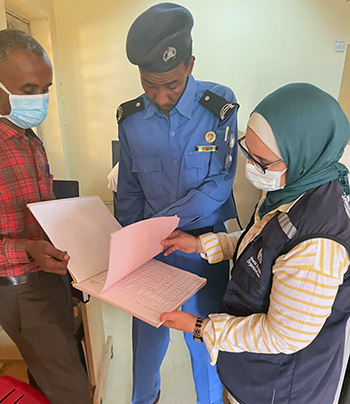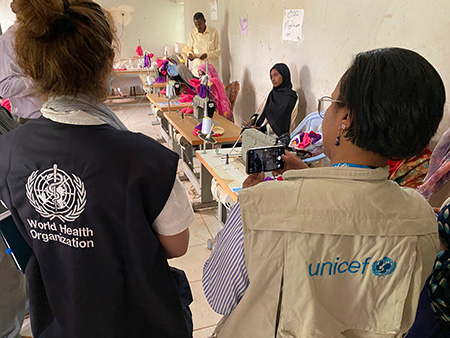 The Research and Knowledge Management pillar member of WHO EMRO’s COVID-19 and other emergencies response review mission to Sudan during a visit to the Central Bureau of Statistics, Khartoum, Sudan, 15 June 2022Cairo, 22 June 2022 – A 10-strong team of multidisciplinary experts from the World Health Organization (WHO) Regional Office for the Eastern Mediterranean has just returned from a mission to Sudan, where they reviewed the country’s response to COVID-19 and other health emergencies. Leading the six-day mission were Regional Emergency Director Dr Richard Brennan, and WHO Representative in Sudan Dr Ni’ma Saeed Abid, who worked closely with acting Federal Minister of Health, Dr Haytham Awad, and Khartoum State Ministry of Health Director-General, Dr Mahmoud Al-Gayem, as well as UN partners – particularly UNICEF – and local nongovernmental organizations.
The Research and Knowledge Management pillar member of WHO EMRO’s COVID-19 and other emergencies response review mission to Sudan during a visit to the Central Bureau of Statistics, Khartoum, Sudan, 15 June 2022Cairo, 22 June 2022 – A 10-strong team of multidisciplinary experts from the World Health Organization (WHO) Regional Office for the Eastern Mediterranean has just returned from a mission to Sudan, where they reviewed the country’s response to COVID-19 and other health emergencies. Leading the six-day mission were Regional Emergency Director Dr Richard Brennan, and WHO Representative in Sudan Dr Ni’ma Saeed Abid, who worked closely with acting Federal Minister of Health, Dr Haytham Awad, and Khartoum State Ministry of Health Director-General, Dr Mahmoud Al-Gayem, as well as UN partners – particularly UNICEF – and local nongovernmental organizations.
“We all know that there have been a lot of missions to Sudan over the past few years. The most important results of this particular mission are actionable recommendations and a targeted plan,” said Dr Brennan, who presented the team’s preliminary findings and recommendations to the Federal Minister of Health and a large assembly of ministry officials, along with members of the Sudan WHO country office, UN partners and other stakeholders on Friday 17 June 2022.
Among the mission’s recommendations were: revising the national COVID-19 vaccination strategy – including prioritizing focus on priority groups such as health care workers, individuals with comorbidities, the elderly and refugees; ensuring adherence to the national treatment protocol for COVID-19; developing a plan to scale up access to medical oxygen; revitalizing cross-border collaboration on health security issues with neighbouring countries, beginning with Egypt; authorizing state media offices affiliated to the Ministry of Health to engage directly with the media on state-level issues; and developing a risk communication and community engagement strategy with defined roles and responsibilities at the national, state and locality levels, among others. Cutting across the nine examined pillars, however, was the elimination of overlapping authorities for enhanced coordination and streamlined future responses within the Ministry of Health.
 The Risk Communication and Community Engagement pillar member of WHO EMRO’s COVID-19 and other emergencies response review mission to Sudan and UNICEF Sudan counterpart visit a sewing workshop for reusable masks in Jabal Al-Awlyaa locality, Khartoum State, Sudan, 14 June 2022In addition to examining Sudan’s COVID-19 response, the mission’s objectives included the facilitation of stakeholder consensus-building to identify gaps and the review of the country’s readiness to respond to other priority risks.
The Risk Communication and Community Engagement pillar member of WHO EMRO’s COVID-19 and other emergencies response review mission to Sudan and UNICEF Sudan counterpart visit a sewing workshop for reusable masks in Jabal Al-Awlyaa locality, Khartoum State, Sudan, 14 June 2022In addition to examining Sudan’s COVID-19 response, the mission’s objectives included the facilitation of stakeholder consensus-building to identify gaps and the review of the country’s readiness to respond to other priority risks.
“We face almost the same emergencies in Sudan each year with varying degrees of severity, so we need to be more focused on preparedness,” observed Dr Abid.
The mission’s assessment mechanism included desk reviews, on-site interviews with a wide array of key informants, group discussions, bilateral talks, direct observations and field visits. The latter included primary, secondary and tertiary care centres, two testing sites, the national public health laboratory, the Ministry of Health-affiliated call centre, a private isolation facility, Khartoum International Airport, SUNA News Agency and an oxygen production site, among numerous other visits in the locality of Khartoum. While some pillars also examined other localities in Khartoum State – such as Omdurman and Jebel Al-Awlyaa – others headed out to River Nile State for a two-day review visit.
The nine examined pillars were Partnership and Coordination, Communications (external and internal), Infection Prevention and Control, Case Management and Clinical Operations, International Health Regulations and Social Measures, Risk Communication and Community Engagement, Research and Knowledge Management, Essential Health Services and Systems, and COVID-19 Vaccine.




